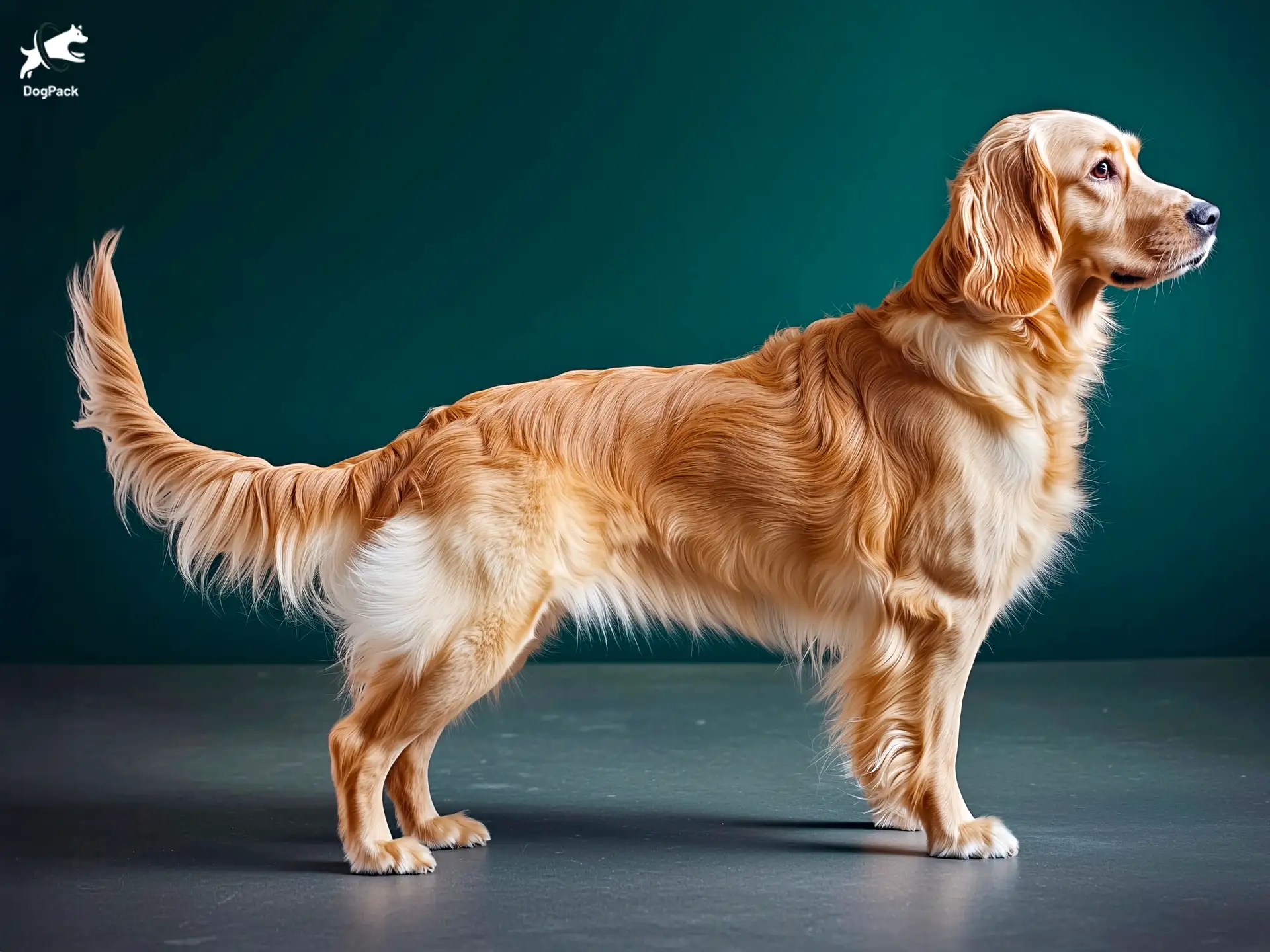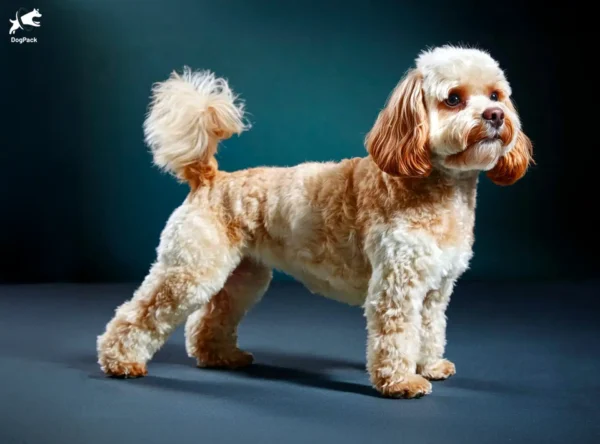Golden Cocker Retriever Dog Breed Info & Overview
Bursting with charm and affection, the Golden Cocker Retriever is the result of crossing a Golden Retriever with a Cocker Spaniel. Beloved for its bouncy personality and sunny disposition, this hybrid often wins hearts at first sight. Whether you’re looking for a loyal companion or a playful family pet, this dog checks all the boxes.
Characteristics
Pictures
Breed History
In the late 20th century, breeders sought to combine the easygoing nature of the Golden Retriever with the smaller size and spunk of the Cocker Spaniel. By blending these two beloved Sporting breeds, they hoped to develop a dog that could excel as both a companion and a mild hunting partner, especially suited for families who cherished an active lifestyle.
As word spread about this new mix, pet lovers across the United States started noticing the breed’s charming traits—loyalty, intelligence, and a penchant for fun. Many credit smaller kennels and home breeders for refining the cross, focusing on preserving a balanced temperament and robust health. This approach helped establish a more consistent look and personality over time. These pups gained recognition outside their region of origin, too.
Today, owners adore how the Golden Cocker Retriever merges the best qualities of both parent breeds. While it’s still considered a relatively new hybrid, its popularity continues to rise. Enthusiasts describe it as a perfect blend of sweet-natured devotion and playful curiosity, making the mix a go-to choice for those seeking a loyal family companion with a friendly spark.
Temperament, Personality
Combining the gentle warmth of a Golden with the lively spark of a Cocker Spaniel, this dog’s personality is a delightful mix. They thrive on being near their people, often following family members around the home. Expect a friendly greeting for guests—they’re more likely to bring a squeaky toy to say hello than bark at strangers.
Their outgoing nature typically extends to children and other pets, making them fantastic playmates in a lively household. Early socialization remains important to ensure they don’t become overly excitable, though these pups are generally eager to get along with just about anyone. Timid behavior isn’t common, so expect a tail that rarely stops wagging when meeting new friends.
Because they’re so people-oriented, a Golden Cocker Retriever may experience separation anxiety if left alone for long periods. Providing them with puzzle toys, interactive games, or regular canine playdates can help keep their mood upbeat. In return, you’ll have a devoted companion who reads your emotions like a pro and offers unwavering loyalty whenever you need a furry confidant.
Physical Characteristics
Most individuals inherit a well-proportioned build, often standing between 20 and 28 inches tall. Their physique strikes a balance between the sturdy frame of a Golden Retriever and the compact elegance of a Cocker Spaniel. The result is a medium-sized dog with a muscular yet agile appearance, suitable for romping around the yard or trotting by your side on walks.
The coat can vary, but it typically remains soft and wavy, reflecting both parents’ lush fur. Shades range from golden hues to light creams, occasionally with white patches on the chest or paws. Some develop the trademark feathering seen in retrievers, while others might inherit a more abundant ear fringe, characteristic of a traditional Cocker Spaniel’s plush look.
Facial features often include soulful eyes and floppy ears that convey an alert but affectionate expression. Although there’s some variation, most have a gently tapered muzzle and a warm, inviting gaze. Collectively, these traits combine to give the Golden Cocker Retriever a refined yet approachable appearance—just one more reason why so many people can’t resist this enchanting cross.
Health Issues
As with any mixed breed, they may inherit certain predispositions from their parent lines. Common concerns seen in Golden Retrievers—like hip dysplasia and certain heart conditions—can appear, as can Cocker Spaniel issues such as ear infections. Regular veterinary checkups, including monitoring joint health and ear cleaning, help catch these problems early and maintain overall well-being.
Eye problems, including cataracts and progressive retinal atrophy, may also surface, requiring routine exams to ensure proper treatment. Dental care is another focal point—especially for dogs inheriting narrower jaws—so keep teeth clean to avoid buildup and gum disease. By staying proactive about screening, owners can significantly reduce the likelihood of serious health complications down the road.
Ensuring your Golden Cocker Retriever maintains a healthy weight is vital, as excessive pounds place extra stress on joints and the cardiovascular system. Periodic blood tests can check organ function, while a balanced diet supports immune health. With attentive care and regular vet visits, these dogs often enjoy long, active lives filled with tail-wagging enthusiasm at every turn.
Grooming Needs
Because these pups can inherit the thicker coat of a Golden or the flowing locks of a Cocker, grooming needs vary. Generally, expect to brush two to three times a week to prevent tangles. A slicker brush or comb works wonders on feathered areas like the legs and ears, which are prone to mats. Brushing also helps control moderate shedding.
Keeping the ears clean is paramount to avoid infections, as Cocker-like ears can trap moisture. Use a vet-approved cleaner and check for redness or odor weekly. Bathing once every month or two keeps them fresh, but over-bathing strips natural oils. Trim the hair around paw pads and in the ear canal to help maintain optimal hygiene and comfort.
For a Golden Cocker Retriever with heavier feathering, professional grooming every few months may help maintain a tidy look. Keep nails trimmed to prevent foot discomfort, and brush teeth regularly to reduce plaque. Combining at-home care with occasional visits to a trusted groomer ensures your pup not only looks great but also stays healthy from snout to tail.
Exercise Requirements
These energetic dogs thrive on physical activity. Daily walks are a must, with at least one brisk session lasting 30 minutes or more. If you’ve got a fenced yard, interactive games like fetch or tug-of-war will satisfy their playful instincts. In addition to cardio, mental challenges—puzzle toys or scent work—help keep them from getting bored or restless.
Swimming can be a fantastic outlet, given their Retriever lineage. Many love splashing around and will eagerly chase a floating toy in the water. Off-leash dog parks also provide ample socialization opportunities, but ensure your pet responds well to recall commands before venturing into open spaces. With consistent activity, they remain fit and less prone to destructive boredom behaviors.
A Golden Cocker Retriever typically does best with about one to two hours of exercise per day. This can be split between walks, play sessions, and short training intervals. Failing to meet their exercise needs may result in restlessness or anxiety. Incorporating variety—like hiking trails or canine sports—keeps both their body and mind engaged, leading to a healthier, happier companion.
Training Tips
This cross typically inherits a strong desire to please, so positive reinforcement methods work wonders. Reward them with treats, praise, or playtime whenever they follow commands correctly. Patience is key—while they’re eager learners, a gentle approach prevents shyness or stubborn streaks. Start with basic cues like “sit” and “stay,” then gradually introduce more complex tasks as they gain confidence.
Socialization from puppyhood ensures they grow comfortable around people, dogs, and varied environments. Puppy classes or supervised playgroups help them develop polite canine manners early on. Consistency in training schedules prevents confusion—stick to the same commands and signals across family members. Because they’re enthusiastic, it’s wise to keep sessions short and fun, reinforcing success with quick rewards.
For a Golden Cocker Retriever, mental stimulation can be as crucial as physical exercise. Tasks like searching for hidden treats or learning name recognition for toys challenge their inquisitive minds. Incorporate puzzle feeders during mealtime to turn eating into a rewarding brain exercise. Regular, gentle guidance builds trust, solidifies commands, and ensures well-rounded development into adulthood.
Nutrition, Diet
Due to their moderate-to-high energy levels, these dogs benefit from a nutrient-dense diet. An adult might require around 2.5 to 3 cups of quality kibble per day, split into two meals. Look for formulas containing real meat proteins, healthy fats, and limited fillers. If your pet is especially active—like running or swimming regularly—they may need slightly higher caloric intake.
Overfeeding can lead to obesity, straining joints and increasing the risk of heart issues. Monitor body condition rather than strictly relying on portion sizes. If you notice a thickening waist or difficulty feeling the ribs, consult a vet about adjusting meal quantities. Gradual changes are better than sudden diet shifts, which can upset digestion and create picky eating habits.
For a Golden Cocker Retriever, balanced feeding might also include occasional supplementation. Fish oil can support joint health and coat shine, while glucosamine may help protect active joints. Always discuss supplement plans with your vet to ensure they suit your dog’s specific needs. Avoid over-reliance on treats—use them strategically during training to reward good behavior without piling on extra calories.
Adoption, Breeders
When looking for a trustworthy source, seek breeders who specialize in this mix and prioritize health testing for both parent lines. They should provide documentation on genetic screenings and early vet care. Visiting the premises is ideal: you can see how pups are raised. Avoid sellers who cannot show health records or won’t let you meet the parents.
If you’d prefer adoption, check local rescues or broader organizations focusing on Retrievers or Spaniels. Online portals like Petfinder and Adopt a Pet often list mixed-breed dogs in need of homes. Don’t be surprised if you find a slightly older pup or adult that’s already house-trained—an excellent option for those wanting to skip the intense puppy stage.
A Golden Cocker Retriever can also appear in breed-specific rescues, especially when families realize they need a more active lifestyle. Always ask about the dog’s history, health, and temperament before bringing them home. Reputable rescues and breeders will gladly share advice to ensure a smooth transition. Ultimately, thorough research and patience pave the way to finding the right companion.
Family Pet?
If you have kids, this mix typically excels at being a patient and fun playmate. Gentle by nature, they often adapt well to the noise and bustle of a family home. Their smaller size than a Golden means they’re easier to manage around young children, yet they retain enough sturdiness to keep up with running, jumping, and games of chase.
Supervision is still necessary with toddlers, as any dog can become overwhelmed by too much rough handling. Teach children to respect the dog’s boundaries—like allowing it space during mealtimes or rest. This fosters trust on both sides. Because of their social nature, they generally like being included in family activities, whether it’s a movie night or a weekend barbecue.
When it comes to other pets, most get along well if introduced carefully. This is especially true if they’ve been socialized from puppyhood. A Golden Cocker Retriever’s gentle temperament helps, but early and positive interactions with cats or smaller dogs remain crucial. Done right, you’ll end up with a harmonious multi-pet household filled with wagging tails and playful curiosity.
Right For You?
Before welcoming this mix into your life, consider your activity level. If you’re up for regular walks, playful fetch sessions, and occasional outdoor adventures, you’ll be a great match. Busy individuals who spend long hours away might face issues with boredom or separation anxiety. These dogs thrive in environments where they receive consistent interaction, both mentally and physically.
Your living space is another factor. While a house with a yard is ideal, an apartment can work if you commit to daily exercise and mental stimulation. Grooming needs also play a role in your decision—be prepared for regular brushing to keep coats healthy and mat-free. If you relish a tidy home above else, moderate shedding might be a consideration.
For families craving a sociable companion, the Golden Cocker Retriever often hits the mark. They bring an enthusiastic, affectionate vibe that suits active households. On the flip side, those wanting a low-energy pet or minimal grooming might find a different breed more suitable. Ultimately, weigh your lifestyle, home setup, and willingness to train to determine if they’re the perfect fit.
Conclusion
In summary, this cross has carved a niche among dog lovers seeking an energetic yet gentle companion. They combine the sporting heritage of their retriever and spaniel ancestors with a friendly, eager-to-please spirit, making them ideal for families and individuals who value active lifestyles. From their endearing floppy ears to their unwavering loyalty, every trait contributes to an affectionate and playful nature. A Golden Cocker Retriever requires consistent engagement, both physically and mentally, to stay happy. If you can meet their exercise, grooming, and social needs, you’ll find a devoted friend always ready for the next adventure. With proper care and early training, these dogs can thrive in many settings, bringing joy and wagging tails for years to come.
FAQs
-
Do Golden Cocker Retrievers inherit the “soft mouth” trait from their parent breeds?
Yes! The Golden Cocker Retriever often inherits the gentle bite of both the Golden Retriever and Cocker Spaniel. This makes them great for retrieving objects without damaging them, a trait originally bred for hunting but now useful in games like fetch.
-
Why does my Golden Cocker Retriever follow me everywhere?
This breed is known for strong attachment to its owners, a trait inherited from both parent breeds. Golden Cocker Retrievers thrive on companionship and can develop separation anxiety if left alone too long. Training and interactive toys can help build independence.
-
Are Golden Cocker Retrievers good for scent work or tracking?
Yes! Thanks to the Cocker Spaniel’s hunting background, Golden Cocker Retrievers have a strong sense of smell and can excel in nose work, tracking games, and even search-and-rescue training. Their intelligence and eagerness to please make them quick learners.
-
Why does my Golden Cocker Retriever love water so much?
Both the Golden Retriever and Cocker Spaniel were bred for water retrieval, so many Golden Cocker Retrievers instinctively love swimming. If yours hesitates, introduce water gradually with shallow play areas and positive reinforcement.
-
Does the Golden Cocker Retriever’s coat change color over time?
Yes! Some puppies are born with lighter or darker fur than their final adult coat. Many will develop golden highlights or deepening shades as they mature, often influenced by their Cocker Spaniel heritage. Regular grooming enhances their beautiful, wavy fur.
Breed Ratings
Bursting with curiosity, they pick up commands quickly, though consistent reinforcement is needed to keep them mentally stimulated.
Always ready for fetch or tug-of-war, they bring endless amusement to families and love any chance to show off their goofy side.
They thrive on daily walks and active play. Without sufficient outlet for their energy, expect boredom barks or mischievous behaviors.
Moderate shedding occurs year-round, especially during seasonal changes. Regular brushing controls loose fur and keeps the coat looking healthy.
Though not as intense as some hunting breeds, they may still chase small critters. Early training helps them learn to redirect effectively.
Their coat requires routine brushing, occasional trims, and careful ear maintenance. It’s manageable but demands consistent effort to avoid mats.
Eager to please and food-motivated, they learn fast. Positive reinforcement methods yield the best results for reliable obedience.
They’re quite people-oriented and can develop separation anxiety. Long periods alone can lead to stress and unwanted behaviors.
Expect warning barks when visitors arrive. They’re not excessive vocalists, but consistent engagement curbs attention-seeking yaps.
Drooling is usually minimal, though it can increase around mealtime or if they inherit more Golden Retriever facial traits.
They typically enjoy canine companionship. Early, positive interactions foster a sociable nature with most dogs they meet.
Generally robust, but prone to ear infections and some inherited conditions. Proper care, checkups, and weight management support longevity.













